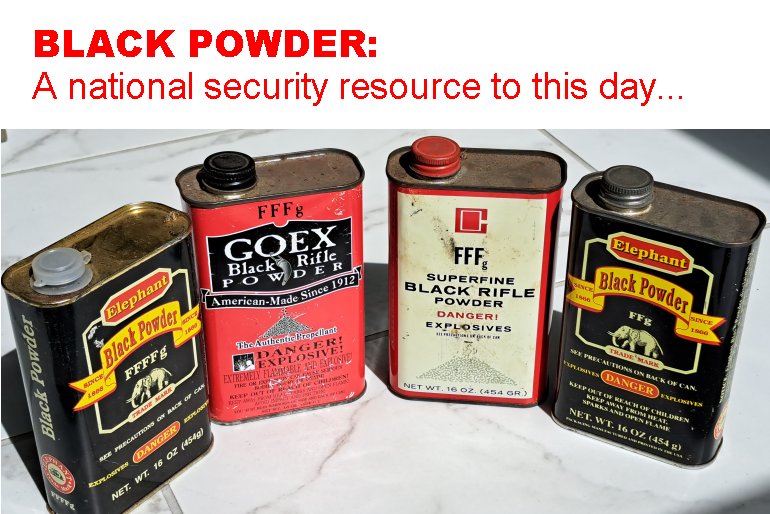You know that black powder you have in your closet for your muzzle-stuffer rifle? It’s a natural security resource. Yep. Believe it or not, the US military relies on it in a number of roles, primarily in explosive trains for modern munitions.
How about that?
It’s true. You ask what are “explosive trains”? As an example, the 155mm artillery rounds have a primer that ignites a patch of fast-burning powder (black powder) which then ignites the big old propellant charge of powder (the green cylinder in the screen capture below) that sends Mr. 155 round downrange to ruin someone’s day. Or several someones’ day.

What’s alarming is that apparently, per the Wall Street Journal, the sole manufacturer of black powder ceased production after a rather exciting explosion at their plant, leaving America without a producer.
Guess it’s time to import some in quantity, eh?
Here’s the story from the WSJ, and we stopped the snip about the time the highly dubious “reportage” began… including that bullets for the M16 rifle require black powder.
From the Wall Street Journal…
MINDEN, La.—Nearly two years ago, an errant spark inside a mill caused an explosion so big it destroyed all the building’s equipment and blew a corrugated fiberglass wall 100 feet.
It also shut down the sole domestic source of an explosive the Department of Defense relies on to produce bullets, mortar shells, artillery rounds and Tomahawk missiles.
The ramshackle facility makes the original form of gunpowder, known today as black powder, a highly combustible material with hundreds of military applications. The product, for which there is no substitute, is used in small quantities in munitions to ignite more powerful explosives.
Military suppliers consolidated at the Cold War’s end, under pressure to reduce defense costs and streamline the nation’s industrial base. Over the past three decades, the number of fixed wing aircraft suppliers in the U.S. has declined from eight to three. During the same period, major surface ship producers fell from eight to two, and today, only three American companies supply over 90% of the Pentagon’s missile stockpile.Only one foundry in the U.S. makes the titanium castings used in howitzers, and only one company makes the rocket motor used in the Javelin antitank weapon widely used in Ukraine.
Lower-tier defense firms are often the sole maker of vital parts—such as black powder—and a single crisis can bring production to a standstill.
Today that’s emerging as a gnawing problem for the U.S., whether in supplying weapons and ammunition to Ukraine or in restocking reserves to prepare for a potential confrontation with China in the new era of great-power competition, according to U.S. military officials, defense experts and congressional staffers.
After months of supplying Ukraine with Stingers, howitzers, anti-armor systems and artillery ammunition, stocks are low in both the U.S. and its NATO allies, especially in 155mm howitzer shells, an ammunition that has been crucial to pushing back Russian forces.
There’s some good news. The good folks at Estes – yes, the model rocket people – have rebuilt the facility and plan to resume production of the age-old black powder later this summer. Hip hip hooray. Hopefully nobody will do anything silly and allow a static electricity spark or anything else to trigger another blast during the production process.

Hell – I’d be happy if smokeless and primers would come off of the insane inflation we have seen since Mr. Potato Head moved into the White House.